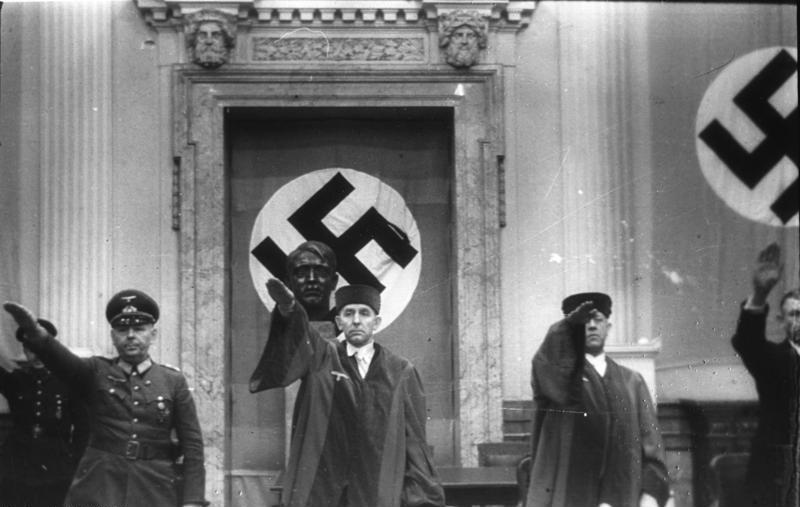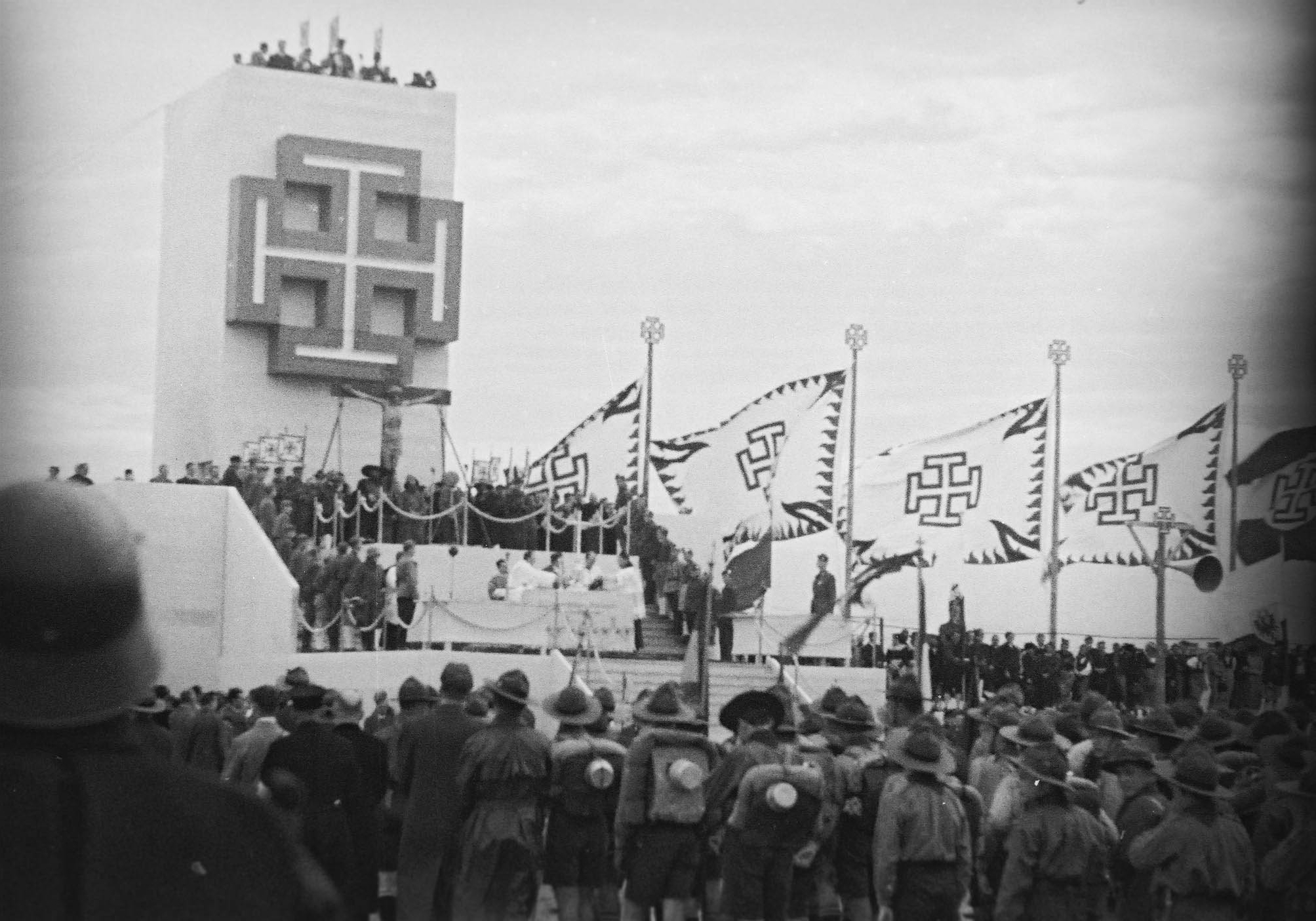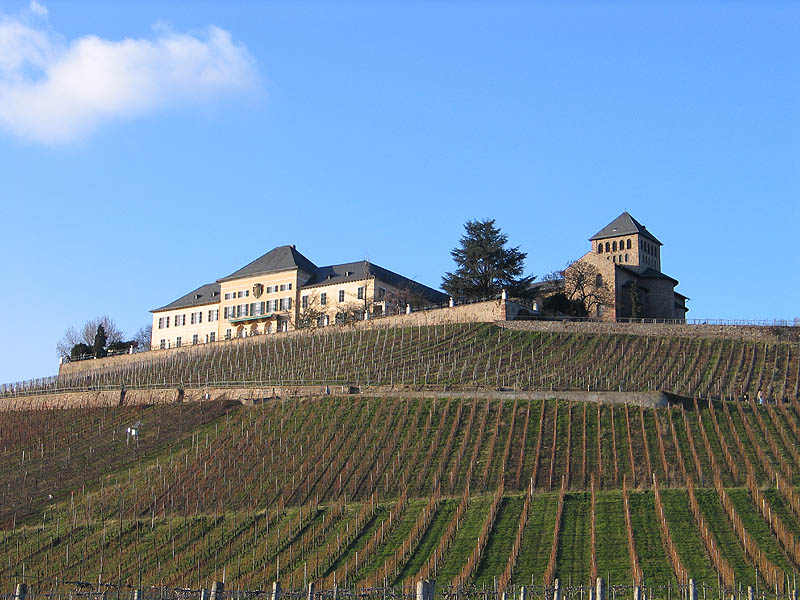|
Fritz Zweigelt
Friedrich (Fritz) Zweigelt (born 13 January 1888 in Hitzendorf near Graz, died 18 September 1964 in Graz) was an Austrian entomologist and phytologist. Zweigelt was one of the most influential and internationally renowned figures in Austrian vine growing between 1921 and 1945. He was Head of State Vine Cultivation during the period of the First Austrian Republic and also acted as Director of the School of Viticulture and Horticulture in Klosterneuburg near Vienna. The grape variety " Blauer Zweigelt" is named after him. Blauer Zweigelt is grown across an area of some 6,400 hectares in Austria, making it by far the most significant red wine grape cultivated in the country. Zweigelt's National Socialist sympathies and activities did not come to the attention of the public for some decades. Biography 1888–1933 Friedrich Zweigelt was born in Hitzendorf near Graz in Styria on 13 January 1888. In 1912, he entered the services of the Imperial School of Viticulture and Horticulture in ... [...More Info...] [...Related Items...] OR: [Wikipedia] [Google] [Baidu] |
Hitzendorf
Hitzendorf is a municipality in the district of Graz-Umgebung in the Austrian state of Styria. Subdivisions It comprises Altenberg, Altreiteregg, Berndorf, Doblegg, Hitzendorf, Höllberg, Holzberg, Mayersdorf, Michlbach, Neureiteregg, Niederberg, Oberberg and Pirka. Population Personalities Fritz Zweigelt, breeder of the Zweigelt The Zweigelt, also known as Rotburger, is a new Austrian grape created in 1922 by Friedrich Zweigelt (1888–1964), who later became Director of the Federal Institute and Experimental Station of Viticulture, Fruit Production and Horticulture ( ... red wine grape variety, was born here in 1888. References Lavanttal Alps Cities and towns in Graz-Umgebung District {{Styria-geo-stub ... [...More Info...] [...Related Items...] OR: [Wikipedia] [Google] [Baidu] |
Direct Producers
Direct may refer to: Mathematics * Directed set, in order theory * Direct limit of (pre), sheaves * Direct sum of modules, a construction in abstract algebra which combines several vector spaces Computing * Direct access (other), a method of accessing data in a database * Direct connect (other), various methods of telecommunications and computer networking * Direct memory access, access to memory by hardware subsystems independently of the CPU Entertainment * ''Direct'' (Tower of Power album) * ''Direct'' (Vangelis album) * ''Direct'' (EP), by The 77s Other uses * Nintendo Direct, an online presentation frequently held by Nintendo * Mars Direct, a proposal for a crewed mission to Mars * DIRECT, a proposed space shuttle-derived launch vehicle * DirectX, a proprietary dynamic media platform * Direct current, a direct flow of electricity * Direct examination, the in-trial questioning of a witness by the party who has called him or her to testify See ... [...More Info...] [...Related Items...] OR: [Wikipedia] [Google] [Baidu] |
Austrian Freedom Movement
Austrian may refer to: * Austrians, someone from Austria or of Austrian descent ** Someone who is considered an Austrian citizen, see Austrian nationality law * Austrian German dialect * Something associated with the country Austria, for example: ** Austria-Hungary ** Austrian Airlines (AUA) ** Austrian cuisine ** Austrian Empire ** Austrian monarchy ** Austrian German (language/dialects) ** Austrian literature ** Austrian nationality law ** Austrian Service Abroad ** Music of Austria **Austrian School of Economics * Economists of the Austrian school of economic thought * The Austrian Attack variation of the Pirc Defence chess opening. See also * * * Austria (other) * Australian (other) * L'Autrichienne (other) is the feminine form of the French word , meaning "The Austrian". It may refer to: *A derogatory nickname for Queen Marie Antoinette of France *L'Autrichienne (film), ''L'Autrichienne'' (film), a 1990 French film on Marie Antoinette with ... [...More Info...] [...Related Items...] OR: [Wikipedia] [Google] [Baidu] |
Gestapo
The (), abbreviated Gestapo (; ), was the official secret police of Nazi Germany and in German-occupied Europe. The force was created by Hermann Göring in 1933 by combining the various political police agencies of Prussia into one organisation. On 20 April 1934, oversight of the Gestapo passed to the head of the ''Schutzstaffel'' (SS), Heinrich Himmler, who was also appointed Chief of German Police by Hitler in 1936. Instead of being exclusively a Prussian state agency, the Gestapo became a national one as a sub-office of the (SiPo; Security Police). From 27 September 1939, it was administered by the Reich Security Main Office (RSHA). It became known as (Dept) 4 of the RSHA and was considered a sister organisation to the (SD; Security Service). During World War II, the Gestapo played a key role in the Holocaust. After the war ended, the Gestapo was declared a criminal organisation by the International Military Tribunal (IMT) at the Nuremberg trials. History After Adol ... [...More Info...] [...Related Items...] OR: [Wikipedia] [Google] [Baidu] |
Volksgericht
The People's Court (german: Volksgerichtshof, acronymed to ''VGH'') was a ' ("special court") of Nazi Germany, set up outside the operations of the constitutional frame of law. Its headquarters were originally located in the former Prussian House of Lords in Berlin, later moved to the former '' Königliches Wilhelms-Gymnasium'' at Bellevuestrasse 15 in Potsdamer Platz (the location now occupied by the Sony Center; a marker is located on the sidewalk nearby). The court was established in 1934 by order of Reich Chancellor Adolf Hitler, in response to his dissatisfaction at the outcome of the Reichstag fire trial in front of the Reich Court of Justice (''Reichsgericht'') in which all but one of the defendants were acquitted. The court had jurisdiction over a rather broad array of "political offenses", which included crimes like black marketeering, work slowdowns, defeatism, and treason against Nazi Germany. These crimes were viewed by the court as ''Wehrkraftzersetzung'' ("the dis ... [...More Info...] [...Related Items...] OR: [Wikipedia] [Google] [Baidu] |
Third Reich
Nazi Germany (lit. "National Socialist State"), ' (lit. "Nazi State") for short; also ' (lit. "National Socialist Germany") (officially known as the German Reich from 1933 until 1943, and the Greater German Reich from 1943 to 1945) was the German state between 1933 and 1945, when Adolf Hitler and the Nazi Party controlled the country, transforming it into a dictatorship. Under Hitler's rule, Germany quickly became a totalitarian state where nearly all aspects of life were controlled by the government. The Third Reich, meaning "Third Realm" or "Third Empire", alluded to the Nazi claim that Nazi Germany was the successor to the earlier Holy Roman Empire (800–1806) and German Empire (1871–1918). The Third Reich, which Hitler and the Nazis referred to as the Thousand-Year Reich, ended in May 1945 after just 12 years when the Allies defeated Germany, ending World War II in Europe. On 30 January 1933, Hitler was appointed chancellor of Germany, the head of government, ... [...More Info...] [...Related Items...] OR: [Wikipedia] [Google] [Baidu] |
Berlin
Berlin ( , ) is the capital and largest city of Germany by both area and population. Its 3.7 million inhabitants make it the European Union's most populous city, according to population within city limits. One of Germany's sixteen constituent states, Berlin is surrounded by the State of Brandenburg and contiguous with Potsdam, Brandenburg's capital. Berlin's urban area, which has a population of around 4.5 million, is the second most populous urban area in Germany after the Ruhr. The Berlin-Brandenburg capital region has around 6.2 million inhabitants and is Germany's third-largest metropolitan region after the Rhine-Ruhr and Rhine-Main regions. Berlin straddles the banks of the Spree, which flows into the Havel (a tributary of the Elbe) in the western borough of Spandau. Among the city's main topographical features are the many lakes in the western and southeastern boroughs formed by the Spree, Havel and Dahme, the largest of which is Lake Müggelsee. Due to its l ... [...More Info...] [...Related Items...] OR: [Wikipedia] [Google] [Baidu] |
Reichsnährstand
The ''Reichsnährstand'' or 'State Food Society', was a government body set up in Nazi Germany to regulate food production. Foundation The Reichsnährstand was founded by the Reichsnährstandsgesetz (decree) of 13 September 1933; it was led by R. Walther Darré. Policies and consequences The Reichsnährstand had legal authority over everyone involved in agricultural production and distribution. It attempted to interfere in the market for agricultural goods, using a complex system of orders, price controls, and prohibitions, through regional marketing associations. Under the “Hereditary Farm Law of 1933” (''Reichsnährstandsgesetz''), farmers were bound to their land since most agricultural land could not be sold. The law was enacted to protect and preserve Germany's smaller hereditary estates that were no larger than 308 acres. Below that acreage, farmlands could “not be sold, divided, mortgaged or foreclosed on for debt.” Cartel-like marketing boards fixed prices, regulat ... [...More Info...] [...Related Items...] OR: [Wikipedia] [Google] [Baidu] |
Federal State Of Austria
The Federal State of Austria ( de-AT, Bundesstaat Österreich; colloquially known as the , "Corporate State") was a continuation of the First Austrian Republic between 1934 and 1938 when it was a one-party state led by the clerical fascist Fatherland Front. The concept, derived from the notion of (" estates" or " corporations"), was advocated by leading regime politicians such as Engelbert Dollfuss and Kurt Schuschnigg. The result was an authoritarian government based on a mix of Italian Fascist and conservative Catholic influences. It ended in March 1938 with the Anschluss (the German annexation of Austria). Austria would not become an independent country again until 1955, when the Austrian State Treaty ended the Allied occupation of Austria. History In the 1890s, the founding members of the conservative-clerical Christian Social Party (CS) like Karl von Vogelsang and the Vienna mayor Karl Lueger had already developed anti-liberal views, though primarily from an econ ... [...More Info...] [...Related Items...] OR: [Wikipedia] [Google] [Baidu] |
Geisenheim
Geisenheim is a town in the Rheingau-Taunus-Kreis in the ''Regierungsbezirk'' of Darmstadt in Hessen, Germany, and is known as ''Weinstadt'' (“Wine Town”), ''Schulstadt'' (“School Town”), ''Domstadt'' (“Cathedral Town”) and ''Lindenstadt'' (“Linden Tree Town”). Geography Location Geisenheim lies on the Rhine’s right bank between Wiesbaden and Rüdesheim, 3 km away to the west. Mainz lies 21 km away to the east. Neighbouring communities Geisenheim borders in the north on the town of Lorch, in the east on the town of Oestrich-Winkel, in the south on the towns of Ingelheim and Bingen (both in Mainz-Bingen in Rhineland-Palatinate) and in the west on the town of Rüdesheim. Constituent communities The town of Geisenheim is divided into four '' Stadtteile'': the main town (also called Geisenheim), Johannisberg (Grund, Berg, Schloßheide), Marienthal and Stephanshausen. Johannisberg might well be the best known of Geisenheim’s constituent com ... [...More Info...] [...Related Items...] OR: [Wikipedia] [Google] [Baidu] |
Anschluss
The (, or , ), also known as the (, en, Annexation of Austria), was the annexation of the Federal State of Austria into the German Reich on 13 March 1938. The idea of an (a united Austria and Germany that would form a " Greater Germany") began after the unification of Germany excluded Austria and the German Austrians from the Prussian-dominated German Empire in 1871. Following the end of World War I with the fall of the Austro-Hungarian Empire, in 1918, the newly formed Republic of German-Austria attempted to form a union with Germany, but the Treaty of Saint Germain (10 September 1919) and the Treaty of Versailles (28 June 1919) forbade both the union and the continued use of the name "German-Austria" (); and stripped Austria of some of its territories, such as the Sudetenland. Prior to the , there had been strong support in both Austria and Germany for unification of the two countries. In the immediate aftermath of the dissolution of the Habsburg monarchy—with ... [...More Info...] [...Related Items...] OR: [Wikipedia] [Google] [Baidu] |
Nazi Party
The Nazi Party, officially the National Socialist German Workers' Party (german: Nationalsozialistische Deutsche Arbeiterpartei or NSDAP), was a far-right politics, far-right political party in Germany active between 1920 and 1945 that created and supported the ideology of Nazism. Its precursor, the German Workers' Party (; DAP), existed from 1919 to 1920. The Nazi Party emerged from the Extremism, extremist German nationalism, German nationalist, racism, racist and populism, populist paramilitary culture, which fought against the communism, communist uprisings in post–World War I Germany. The party was created to draw workers away from communism and into nationalism. Initially, Nazi political strategy focused on anti–big business, anti-bourgeoisie, bourgeois, and anti-capitalism, anti-capitalist rhetoric. This was later downplayed to gain the support of business leaders, and in the 1930s, the party's main focus shifted to Antisemitism, antisemitic and Criticism of ... [...More Info...] [...Related Items...] OR: [Wikipedia] [Google] [Baidu] |





